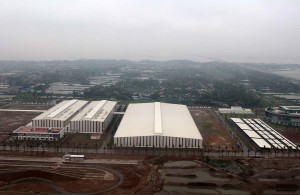
VinFast CEO Jim DeLuca, center left, unveils the company's two offerings with Miss Vietnam, left, and David Beckham, right.
The world’s newest automaker is rapidly ramping up its plans.
Little more than a month ago, during a visit to the new VinFast headquarters and manufacturing complex in Haiphong, an hour outside Hanoi, company officials told TheDetroitBureau.com they were set to focus on the fast-growing Vietnamese automotive market, though they hinted they might look beyond the country’s borders at some time in the future.
That future has apparently come fast. Following a well-reviewed debut of its first two products at the Paris Motor Show earlier this week, VinFast CEO Jim DeLuca revealed in an exclusive interview that “within a year we’ll be able to announce markets outside Vietnam and outside ASEAN (a trade bloc of Southeast Asian nations), to be clear. We’ve got our sights set both domestically and beyond.”
DeLuca pointed to company founder Pham Nhat Vuong, who is also the richest man in Vietnam, for rapidly expanding the company’s horizons.
(Vietnam’s first car company intent on breaking the rules. Click Here for the story.)
What’s perhaps more significant is the fact that the automaker was founded less than two years ago, yet expects to begin production by mid-2019. DeLuca also revealed for the first time that VinFast’s first two products, the Lux A 2.0 sedan and Lux SA 2.0 SUV, are expected to begin shipping to dealers in Vietnam late next August, with sales set to start two weeks later.

The VinFast HQ and plant complex is based on 800 acres on Haiphong Harbor near Hanoi will put out at least 250,000 vehicles annually — more than Vietnam needs.
The decision to expand beyond the Vietnamese market really shouldn’t come as a surprise. New vehicle sales in the once war-torn country barely hit 300,000 last year and, while the economy is growing at a rate of around 7% a year, it could take years to absorb the full capacity that VinFast is putting in place at its 800-acre Haiphong manufacturing complex.
The facility will have a rated capacity of 250,000 vehicles annually once two other models, a minicar and an all-electric vehicle, debut. The minicar is expected to also go into production in late 2019. Though a hard production timetable for the BEV hasn’t been locked in place, it could come in 2020.
The capacity numbers are a bit misleading, however, assuming production of only 38 vehicles an hour, a relatively low rate for what some visitors to the complex describe as one of the world’s most highly automated facilities. There will be virtually no humans in the body shop, for example. Catching up to comparable facilities, which generally run flat-out at 60 vehicles an hour or above, VinFast could eventually produce more than 400,000 cars and SUVs annually, several sources estimated, a figure that DeLuca and other company executives notably did not dismiss.
Even at the current production target, “They will have to look at other markets outside Vietnam,” long-time Asian automotive analyst Michael Dunne told TheDetroitBureau.com recently.
(Click Here for details about David Beckham helping to kick of VinFast’s Paris debut.)
Moving into other parts of ASEAN shouldn’t be difficult, industry analysts said. Expanding beyond that region could prove more challenging. That’s one of the reasons why, DeLuca said, his company is focusing, almost to the point of paranoia, on achieving world-class quality levels.
VinFast’s founder, he noted, has studied the challenges, as well as the successes, of other Asian automakers, including Toyota and Hyundai, and hopes to avoid some of their earlier mistakes.
The company is now negotiating with J.D. Power and Associates, the California quality research and consulting firm, to help it get a grip on its manufacturing processes.
“What keeps me up at night?” the former GM executive said, “Everything.”
(To see more about the origins of and plans for VinFast, Click Here.)
DeLuca and the rest of his team will likely have a lot of sleepless nights, at least until the Lux sedan and SUV models go into production next year.


Overemphasizing an automated process didn’t do Tesla much good. What are these guys doing that Tesla didn’t?
Working with a lot of global experts, like ABB, Magna Steyr, Bosch and Siemens, and relying on some of the best expats from the industry to make sure it all comes together.
But, we’ll see in a matter of months if it works.
Paul E.